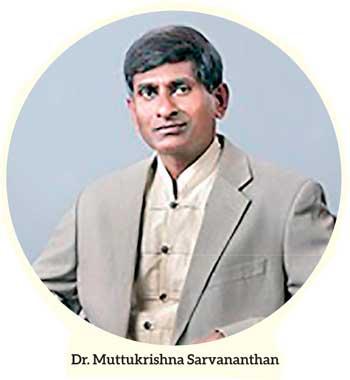Dr. Muttukrishna Sarvananthan A scholar scorned by Jaffna, but restored
 The arts faculties under the University of Ceylon produced stellar scholars like Stanley J. Tambiah (Harvard), Gananath Obeyesekere (Princeton) and Valentine Daniel who rose to the highest levels of their Ivy-League universities. That trend tapered off in time with an occasional scholar here and there. The difference, besides training in independent thought, was vitiated reading and writing fluency to share their research and learn from others’ research in English as mother-tongue education wreaked its havoc.
The arts faculties under the University of Ceylon produced stellar scholars like Stanley J. Tambiah (Harvard), Gananath Obeyesekere (Princeton) and Valentine Daniel who rose to the highest levels of their Ivy-League universities. That trend tapered off in time with an occasional scholar here and there. The difference, besides training in independent thought, was vitiated reading and writing fluency to share their research and learn from others’ research in English as mother-tongue education wreaked its havoc.charges pursued vigorously
 Then came Muttukrishna Sarvananthan. He wrote and published widely. His Research Impact Metrices are h-index 12, i10-index 16 as of August 2023. These are rarely approached numbers for an arts graduate because indexed journals are few. For comparison, the current mathematician VC’s indices are 7 in each.
Then came Muttukrishna Sarvananthan. He wrote and published widely. His Research Impact Metrices are h-index 12, i10-index 16 as of August 2023. These are rarely approached numbers for an arts graduate because indexed journals are few. For comparison, the current mathematician VC’s indices are 7 in each.Sarvananthan joined University of Jaffna as Senior Lecturer Gr. I on 6 May 2019, but he was not fully accepted in a system where scholars are scarce and jealousies high.
Sarvananthan’s first degree being from Delhi did not help in a system that regards only its own degrees as good. His publications and doctorate in Development Economics at the Centre for Development Studies, University of Wales, Swansea, did not seem to matter either. He fended for himself establishing in the year 2004 his Point Pedro Institute of Development (PPID) in Jaffna. For Jaffna, where all kinds of tinpot institutes come up from ear-marked government money through foreign loans, the PPID is unique. Sarvananthan raised his own funds and supported himself for over two decades. Foreign embassies and reporters sought his advice. I believe for sharing his knowledge with students and exchanging ideas with other economists, he made his big mistake of joining University of Jaffna where he should have known that sniping would be the norm, especially when he lacked university experience. But it is good that some saw it fit to hire him.
In our university system examination offenses are taken very seriously. That was Sarvananthan’s Achilles heel. When I was at the UGC I had taken my electrical engineering examination scripts there and left them overnight in my locked up office to continue grading them the next day. A senior administrator who had been at Colombo University earlier told me very sternly that I should never do that because she is aware that a lecturer lost his job when answer scripts he was grading were stolen from him.
Prof. Gintota P. V. Somaratna told me of how a Vice Chancellor who was after him following his conversion to Christianity nailed him by having his examination paper annexed to Somaratne’s examination paper. When Somaratna’s exam packet was opened at the exam, the other paper awaiting examination came out. The powerful don after Somaratna’s scalp then accused him of leaking the VC’s paper. Somaratna was sacked, but that was a blessing in disguise as he has expanded his already prolific writing and teaches in the private university system in Colombo.
In this case Dr. Sarvananthan is accused of two simple errors that he readily admits. He was teaching a course for the first time and the students complained to him that they had no clue as to what questions to expect. Some students were admitted to the course late at the request of the Head and were particularly plaintive. His two subjects were Development Economics and Gender Economics. He had therefore released sample questions to all students; some of which appeared in the exam. This became his offense in Jaffna.
We all take questions from our tutorials for the exam to ease the stress of students. At Colombo there is the famous case of a Tamil Professor of Mathematics who asked his tutors to run through a tutorial just before the exam. The Tamil and English medium tutors did as instructed, but the Sinhalese tutors were not as punctilious. The Lecturer was sacked. At Peradeniya I am aware of a chemical engineering lecturer (now professor) who during every term gives 40 questions from which five are selected for the exam. Some think this is wrong. But none think it’s serious enough to file charges, but not so in Jaffna with Sarvananthan.
In my own time when I was charged with politicising the engineering curriculum by including human rights questions under the syllabus title ‘The Software Engineer and Society’, a senior professor of Tamil laughed and told me, “I say you will not be found guilty because even if you are wrong these academics do everything wrong so that nothing will stick.” As he told me, I was found not guilty.
But in the case of Sarvananthan in Jaffna they pursued the charges vigorously and asked him to show cause as to why he should not be sacked. A hilarious finding is that the University relied on a manual of procedures for conducting exams. It turns out that what the university produced was a partly illegible manual from Rajarata University that had never been approved by the Jaffna Council and was stamped a DRAFT. Surely that cannot be the basis of sacking someone! But it was in Jaffna. There was confusion over Chapter XII pertaining to offences by candidates and Chapter XII applicable to those not candidates. There was reference to ‘President’ without saying who or President of what. It was a case of highly qualified academics who had never looked outside their field and are therefore unable to form a rule competently outside the classroom.
Sarvananthan appealed to the University Services Appeals Board, the USAB. The USAB carefully went through the appeal and, to make it short, the USAB brought out in its Order dated 20 Sept. 2023 (in Application No. 1042) that
i) The head of the department of economics was interested in the post of professor of economics, and Sarvananthan had pointed out untruths in that woman’s professorial application which were overlooked by the Competent Authority;
ii) The Competent Authority of the university, namely Prof. K. Kandasamy, had wrongfully appointed a fact-finding committee without the prior permission of the council;
iii) The convenor of the formal inquiry knowing that Sarvananthan was stuck in Colombo over COVID-19 and even if he returned in time for the inquiry because of quarantine restrictions would be unable to attend his inquiry did not postpone the inquiry. The King can do no worng!
iv) The university appointed the Inquiry Officer, the Prosecutor and the Convenor even before framing the charges and issuing a show cause notice to Sarvananthan. The Board found that the Council wanted the inquiry without waiting for explanations. Sarvananthan was denied the opportunity to comment on and cross examine witnesses. The Board determined that the absence of such opportunity is a violation of procedure and “a total violation of the rules of natural justice and fair procedure.”
v) The Inquiry Officer and the Prosecutor got together and wrote the report jointly, both signing the report together. The Board declared that this shows the inquiry to have been biased and one-sided, “giving credence to all the allegations that the Appellant made against the Respondents and the Inquiry Officer;”
vi) Sarvananthan was not given the opportunity to call witnesses on his behalf;
vii) The appointment of the Inquiry Officer, S. Rajadurai, is illegal not being “within the procedure established by law;”
viii) The formal inquiry “right from the inception has been moving in one direction and having one objectivity in mind, i.e. to find the Appellant guilty and terminate his services … the whole exerciser in our view is contrary to law.”
On the other side, the Board noted that the Appellant had admitted his misconduct and asked whether it warrants punishment in view of his admissions. He has not exculpated himself but there are mitigating circumstances:
i) That he is new to the university system;
ii) This is his first ever examination offence;
iii) His prompt admission of guilt;
iv) That he has always complied and complained;
v) The university did not think his offence fit enough to send him on compulsory leave or interdiction pending inquiry, and did not cancel the examination results;
vi) The Senate releasing the results without finding any fault in the standard of the exam;
vii) No student was found guilty of an examination offence and all of them received the disclosed questions; and vii)
viii) The personal animosity that exists between certain members of the university and the Appellant.
Given these mitigating circumstances there ought to be proportionate punishment, the Board noted. A dismissal from Service in the Board’s view is disproportionate.
Thus it was that one of Jaffna’s best scholars was reinstated in service and is serving the students and the Jaffna community once again.
All those found guilty of wrong-doing continue in office, great men in Jaffna where real heroes have either fled or have no place. Jaffna has to change and a postmortem into these must be conducted and the wrong-doers punished.







